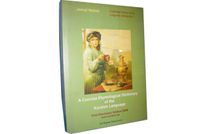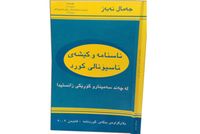Jemal Nebez Award
With this prize, which is awarded in loose succession, at best every second year, we celebrate the exceptional personality of Jemal Nebez and his life's work by finding and then awarding the prize to suitable candidates who are also able to achieve or have already achieved important things in the interests of the Kurds and Kurdistan.
Impressions from the award ceremony on September 21, 2025
Summary of the award ceremony 2025 as PDF :
Please read the speeches by Dr Hannelore Kuchler, Prof. Haci Akman, Dr Mamo Othman and our awardee Prof. Khanna Omarkhali :
Our 2025 Jemal Nebez Laureate elected in March (see the announcement below)
Professor Dr. Khanna Omarkhali
visited us at the foundation on 17.05.2025!
“The Yezidi Religious Textual Tradition from Oral to Written”, which also includes a CD with audio and video recordings.
What a beautiful gift for our library! |
Almost our entire local team took part in the meeting at our premises in Berlin. We all agreed: What a wonderful open meeting!
Our guest on May 17 was also particularly interested in what currently occupies us most at the Foundation, namely our library and archive, which is already located in Spichernstrasse, and the scientific and personal estate of our namesake.
We soon came to talk about the problems that currently stand in the way of an orderly standardization of Kurdish. A further difficulty is the fact that Kurdish is currently written in two writing systems (during the Soviet Union, Kurdish was even written in Cyrillic!) There are various ways of cataloging titles, which are of central importance for libraries and archives. Being able to discuss this with Professor Omarkhali was additional, stimulating and enjoyable.
The meeting was about getting to know each other for the first time, which was made easier by the friendly manner of our guest. When we asked Professor Omarkhali to introduce herself with some important details, she began to talk about her studies at the University of St. Petersburg, which she completed with a Bachelor's and Master's degree in Iranian Studies and Kurdish Philology. After moving to Germany, she completed a doctorate in religious studies and worked for a time in Göttingen. Since 2019, she has been teaching and researching in the Department of Iranian Studies at Freie Universität Berlin.
In our open and informal conversation, we also devoted some of our time to the subject of Kurdology. This was after our guest had mentioned her studies in St. Petersburg and had regrettingsly added that Kurdology no longer had the status of a course of studies any more.
Jemal Nebez, who gave his name to our foundation, is known to have been very committed to the reintroduction of Kurdology in Germany, and especially so at the Free University of Berlin.
After completing his doctorate in Hamburg, he came to Berlin - in the middle of the hot phase of the Cold War - where he first applied for a teaching assignment for the Kurdish language in the Department of Social Sciences at the FU Berlin that had to be renewed every semester. He was accepted and starting teaching Kurdish at the Institute of Iranian Studies - as he had already done elsewhere in Germany.
In addition to his teaching activities at the FU, Nebez found a temporary academic position at the Berlin branch of a special research area of the German Research Foundation in cooperation with the United Theological Seminars of the University of Göttingen, which he held from 1972 to 1976. His fields of work were: pseudo-Muslim religious communities, Arabic alchemy, Manichaeism and the Yazidi religion.
Two years later, in 1978, Jemal Nebez was appointed temporary assistant professor by the same FU Department of Social Sciences at the FU Berlin that until then had been issuing his teaching assignments. He held the position as assistant professor until 1982. His areas of work at the Institute of Iranian Studies were then: Islamic Iran, Persian and other modern Iranian languages.
After leaving the Free University of Berlin, Jemal Nebez (1933-2018) continued to give lectures and seminars in various languages in Germany and elsewhere in Europe, but no longer taught academically. Instead, he continued to research and publish all the more intensively. He earned his living as a freelancer.
We would like to thank Professor Omarkhali for her visit, her friendliness and her openness. We look forward to the upcoming festive event. We know that the organization has not become any easier in the constantly worsening global crisis we are in and are, therefore, giving more time for preparation. We have now received two dates to choose from from the prizewinner.
The date of the ceremony has not yet been set. Like everything else, it will follow at a later date.
This was the NEWS at the time of NEWROZ:
All JN Award winners are outstanding in their own way
As for Jemal Nebez, he was a very thorough thinker. He applied scientific principles to all aspects of life. His first intellectual love was the natural sciences. When it came to deciding what to study, he chose to become a secondary school teacher of physics and mathematics.
His many talents had already become clear in the years before that. His father had him taught several languages as a child and as an adolescent he began to write his own texts.
Gradually, he showed his extraordinary abilities in many areas. He was able to recognize linguistic contexts, enrich the study of history as well as research the causes of the disadvantages of his people throughout his life and reveal some of them.
He was not only well known among Kurds as a scientist and knowledge-based personality, but also for his trustworthiness and intelligent judgment on social issues and in political areas.
All this together, not least the fact that Jemal Nebez was a Kurd and consciously recognized himself as such in all situations, made him an exceptional personality.
Awarding the Jemal Nebez Prize to individuals, groups or projects
The fields in which the Jemal Nebez Science Prize can be awarded are correspondingly extensive, namely politics, law, history, linguistics, art, literature, music, mathematics, medicine and science.
The Jemal Nebez Science Prize can be awarded to worthy individuals, groups or projects.
Ideally awarded every second year
Ideally, the prize should be awarded every second year.
Our solution for finding and selecting candidates
In February 2022, a request was made to the authorities as to whether we could outsource the identification of suitable candidates for the Jemal Nebez Award, including the shortlisting process. We were informed that there were no objections to this procedure under foundation law. In March 2022, we commissioned Sirwan Renas (from Rojhelat or East Kurdistan, currently living in the US) to form a multi-member commission for the purpose, which he succeeded in doing. He chaired the JN Award commission until in 2024 he was called to join the foundation's Excecutive Board.
Fexriye Adsay from Diyarbekir (Amed) in Bakur then served as chairperson of the JN Award commission and organizer of the 2025 JN Award.


















